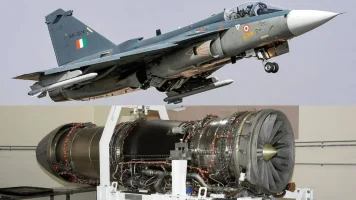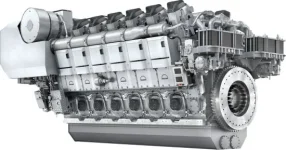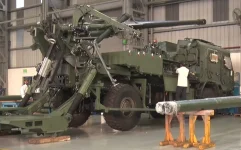- Views: 1K
- Replies: 3
In a significant advancement for India's self-reliance in defence manufacturing, the Indian Navy awarded a Rs 270 crore contract to Kirloskar Oil Engines Limited (KOEL) on April 2, 2025. The agreement focuses on the indigenous design and development of a 6-megawatt (MW) medium-speed marine diesel engine.
This initiative, classified under the 'Make-I' category of defence procurement which involves substantial government funding for research and development, is designed to lessen India's reliance on imported high-power diesel engines.
Furthermore, it establishes the groundwork for a versatile family of engines ranging from 3MW to 10MW, with KOEL expressing strong confidence in its ability to create a 10MW, 20-cylinder version based on the current 6MW V12 design.
This development is being hailed as a crucial turning point for India’s domestic defence industry. The new engines are slated to power both the propulsion systems and onboard power generation for vessels of the Indian Navy and the Indian Coast Guard.
This enhancement of indigenous capability is expected to contribute significantly to bolstering maritime security throughout the strategically important Indian Ocean Region (IOR).
Historically, India has depended on international Original Equipment Manufacturers (OEMs) for marine diesel engines with substantial power capacities. For instance, as recently as 2024, the Brahmaputra-class frigate INS Beas was refitted with imported 6MW engines from Caterpillar.
The new agreement with Pune-based Kirloskar Oil Engines signifies a determined shift towards developing critical propulsion technology within India. The project, which will see the Government of India funding 70% of the development costs, aims to produce a prototype 6MW engine with over 50% locally sourced components, developed entirely through KOEL's in-house expertise.
The contract also mandates the creation of detailed designs for engines that can be scaled from 3MW up to 10MW, offering adaptability for a wide array of naval and coast guard ships.
KOEL has confidently stated its plan to expand the 6MW V12 engine into a 20-cylinder, 10MW powerhouse. Such an engine would be capable of meeting the greater power demands of larger naval vessels.
This ambition directly supports the Indian Navy's requirements for dependable, domestically manufactured engines for its expanding fleet, which includes frigates, destroyers, and various patrol vessels, particularly as India addresses an increasingly complex geopolitical environment in the IOR.
With over 75 years of experience, Kirloskar Oil Engines Limited stands as a prominent figure in the field of internal combustion engines and power generation systems, making it well-suited to lead this ambitious project.
The company's advanced manufacturing infrastructure and robust research and development capabilities have been recognized with numerous honours, including the Maharashtra Ratna in 2010 and several national awards for excellence in energy management and sustainability.
Ms. Gauri Kirloskar, Managing Director of KOEL, conveyed her enthusiasm for the partnership, stating, "This is a proud moment for all of us at Kirloskar Oil Engines, and I am sure that with the technical and R&D strength that we have, we will be able to deliver yet another world-class product to the Indian Navy."
The 6MW medium-speed marine diesel engine, featuring a V12 cylinder configuration, is intended for primary ship propulsion and electricity generation, promising reliability and operational efficiency for naval duties.
The envisioned 10MW, 20-cylinder engine, an advancement of the 6MW design, would markedly improve the Navy's capacity to power larger warships like next-generation frigates and destroyers, which necessitate higher thrust and prolonged operational endurance. The adaptable nature of this engine family ensures it can be used across diverse platforms, from offshore patrol vessels to more substantial warships.
From a strategic perspective, this project aligns seamlessly with Prime Minister Narendra Modi’s "Aatmanirbhar Bharat" (Self-Reliant India) initiative, which seeks to reduce foreign exchange outflows and diminish reliance on overseas suppliers.
The Ministry of Defence has underscored that this programme will serve as a "catalyst for the development of a defence industrial ecosystem in the country," encouraging cooperation between the Navy, Coast Guard, and private sector firms such as KOEL.
This domestic capability is especially vital as India confronts evolving maritime security challenges in the Indian Ocean Region, where maintaining operational independence is of utmost importance.
The development of a 6MW marine diesel engine, and subsequently a potential 10MW version, is an inherently complex undertaking. It will necessitate extensive and rigorous testing to meet the stringent standards set by the navy for dependability, durability, and performance under challenging maritime conditions.
KOEL will also need to ensure that the new engines can be seamlessly integrated into existing naval ship designs while remaining economically viable. Progressing to the 10MW design will require further dedicated research and development to overcome technical hurdles, including effective thermal management and ensuring the structural integrity of a 20-cylinder configuration.
Nevertheless, KOEL's established track record, which includes a significant global footprint in power generation and industrial sectors, provides a strong foundation for overcoming these challenges.
The successful completion of this project could pave the way for KOEL to offer these engines to international markets, potentially establishing India as a significant contributor to global marine propulsion technology.
There has been notable public interest in the project, with observers recognizing the potential of the 6MW engine and the future promise of the 10MW variant for larger naval applications.



